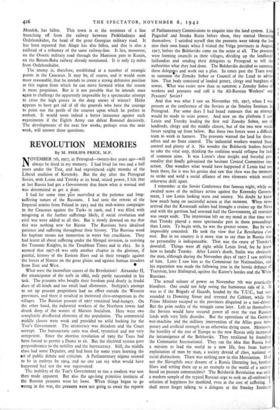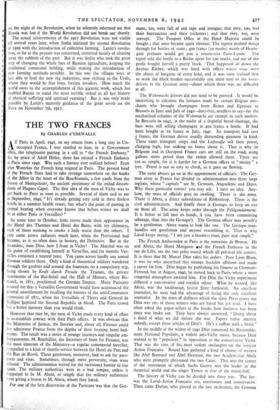REVOLUTION MEMORIES
By M. PHILIPS PRICE, M.P.
NOVEMBER 7th, 1917, in Petrograd—twenty-five years ago—will always be fixed in my memory. I had lived for two and a half years under the Tsar, and had experienced eight months of the Liberal coalition of Kerensky. But the day after the Petrograd Soviet, with Lenin and Trotsky at its head, seized power, I felt that at last Russia had got a Government that knew what it wanted and was determined to get it done.
I had for some time plst marvelled at the patience and long- suffering nature of the Russians. I had seen the reueat of the Imperial armies from Poland in 1915 and the mid-winter campaigns In the Caucasus against the Turks in 1916, and I was filled with misgiving at the further sufferings likely, if social revolution and civil war were added to all this. But it slowly dawned on me that this was nothing new for Russia. The Russians have idealised patience and suffering throughout their history. The Russian word for baptism means not immersion in water but crucifixion. They had learnt all about suffering under the Mongol invasion, in resisting the Teutonic Knights, in the Troublous Times and in 1812. So it seemed that 1917-18 was only another chapter in the glorious, if painful, history of the Eastern Slays and in their struggle against the forces of Nature on the great plains and against human invaders from East and West. • What were the immediate causes of the Revolution? Alexander II, the emancipator of the serfs in 1862, only partly succeeded in his task. The peasants who bought their freedom paid dearly in feudal dues of all kinds and too small land allotments. Stolypin's attempt to set up peasant proprietors had no effect outside the Western provinces, and there it resulted in increased class-antagonism in the villages. The Russian peasant of 1917 remained land-hungry. On the other hand, the industrial workers of the Northern towns had drunk deep of the waters of Marxist Socialism. Here were two completely disaffected elements of the population. The commercial middle classes were weak and provided no solid backing for the Tsar's Government. The aristocracy was decadent and the Court corrupt. The bureaucratic caste was aloof, tyrannical and not very competent. Since the abortive revolution of 1905 the Tsars had been forced to permit a Duma to sit. But the electoral system gave preponderance to the nobility and the bureaucracy. Still, the middle class had some Deputies, and had been for some years learning the art of public debate and criticism. A Parliamentary regime seemed' to be in embryo by 1914, and no one can say what would have happened had not the war supervened.
The inability .of the Tsar's Government to run a modern war was then made apparent. But also the age-long primitive instincts of the Russian peasants were let loose. When things began to go wrong in the war, the peasants were not going to await the reports of Parliamentary Commissions to enquire into the land system. Lik Pugachef and Stenka Razin before them, they started liberatin
themselves. I satisfied myself that the peasants were taking the law into their own hands when I visited the Volga provinces in August, 1917, before the Bolsheviks came on the scene at all. The peasants were forming councils in their villages, dividing up the landlords' latifundias and sending their delegates to Petrograd to tell the authorities what they had done. The Bolsheviks decided to summon these delegates and work out a plan. In times past the Tsars used to summon the Zemsky Sobor or Council of the Land to advise him. That body consisted of landed gentry, clergy and burghers of towns. What was easier now than to summon a Zemsky Sobor of workers and peasants and call it the All-Russian Workers' and Peasants' Soviet?
And that was what I saw on November 7th, 1917, when I was present at the conference of the Soviets at the Smolny Institute in Petrograd. For some days I had heard rumours that an attempt would be made to seize power. And now on the platform I saw Lenin and Trotsky leading the first real Zemsky Sobor, not of landlords, clergy and the middle classes, but of the two new social forces surging up from below. But these two forces were a difficult team to work in harness. The peasants wanted the land for them- selves and no State control. The industrial workers wanted State control and plenty of it. No wonder the Bolshevik leaders feared to take the vital step, thinking the coalition would collapse for lack of common aims. It was Lenin's clear insight and forceful per- sonality that finally galvanised the hesitant Central Committee into action. One wonders what would have happened if Lenin had not been there, for it was his genius that saw that then was the moment to strike and weld a social alliance of two elements which would otherwise drift apart.
I remember at the Soviet Conference that famous night, while we awaited news of the military action against the Kerensky Govern- ment, I saw Lenin looking stern and uneasy. No doubt he knew how much hung on successful action at that moment. When news arrived that the Kronstadt sailors had brought a cruiser up the Neva and with the garrison had arrested half the Government, all restraint was swept aside. The impression left on my mind at that time was that Trotsky played a more spectacular part in those proceedings than Lenin. To begin with, he was the greater orator. But he was impossibly conceited. He took the view that La Revolution c'est moi. But in no country is it more true to say than in Russia that no personality is indispensable. That was the cause of Trotsky's downfall. Things were el right while Lenin lived, for he knew how to handle Trotsky. After Lenin's death, Stalin was obviously the man, although during the November days of 1917 I saw nothing of him. Later I saw hhn as the Commissar for Nationalities, and his reputation was made the following year in the heroic defence of Tsarytsin, later Stalingrad, against the Kaiser's hordes and the 'White Russians.
The actual seizure of power on November 7th was practically bloodless. One could not help seeing the humorous side of it. It was as if the Brigade of Guards, headed by the T.U.C., had sur- rounded to Downing Street and arrested the Cabinet, while the Prime Minister escaped to the provinces disguised as a taxi-driver. But the grim reality of the struggle came later. Left to themselves. the Soviets would have secured power all over the vast Russian lands with very little disorder. But the operations of the German war-machine and the military intervention of the Allies gave tem- porary and artificial strength to an otherwise dying cause. Moreover. the hostility of the rest of Europe to the new Russia only increased the intransigence of the Bolsheviks. They retaliated by founding the Communist International. They ran the idea that Russia had a mission to lead the world to a new life, free from human exploitation of man by man, a society devoid of class, national or racial distinctions. There was nothing new in this Messianism. Had not the Slavophils once dreamt of a Russia liberating her. brother Slays and setting them up as an example to the world of a society based on peasant communities? The Bolshevik Revolution was only a modern sample of the typical Russian urge to seek an all-embracing solution of happiness for mankind, even at the cost of suffering. I shall never forget talking to a delegate at the Smolny Institute
on the night of the Revolution, when he solemnly informed me that Russia was lost if the World Revolution did not break out shortly.
The actual achievements of the 1917 Revolution were not visible till several years later, when Stalin initiated the second Revolution in 1929 with the introduction of collective farming. Lenin's revolu- tion, as far as the peasant was concerned, consisted mainly of clearing away the rubbish of the past. But it was Stalin who took the great step of changing the whole face of Russian agriculture, keeping the traditional communal holding, while making the introduction of new farming methods possible. In this way the villages were at last able to feed the new big industries, now shifting to the Urals, where they would be free from foreign invaders. How much the world owes to the accomplishment of this gigantic work, which has enabled Russia to stand the most terrible ordeal in all her history of physical suffering and spiritual yearning! But it was only made possible by Lenin's masterly guidance of the great revolt on. the Neva on November 7th, 1917.



























 Previous page
Previous page